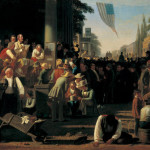Cardinal Christophe Pierre, the apostolic nuncio to the United States, commented on polarization in the Church and society shortly before receiving his red hat. His interview with Vatican Media was titled “Polarization Arises When We Put Ideas before People.” In it, he writes: “the problem is that instead of considering the reality, we escape from the reality, and we take refuge in ideas, and these ideas, became ideologies.” Pope Francis has similarly cautioned against polarization in the Church, most recently in remarks on the current synod. He said the synod should be “a place where the Holy Spirit will purify the church from gossip, ideologies and polarization.”
But I am not sure a commitment to ideas or “ideologies” as such is at the root of our problem. If anything, public debate today has little patience with ideas, directed instead toward the very motives and character of the people one likes or dislikes.
Defining Ideology
One difficulty is in trying to figure out what ideology is. Dictionaries tend to define it as “a system of ideas and ideals, especially one which forms the basis of economic or political theory and policy,” or “the ideas and manner of thinking characteristic of a group, social class, or individual.” By that neutral definition, the Christian message is itself an ideology, a set of ideas that is (or should be) characteristic of Christians.
Start your day with Public Discourse
Sign up and get our daily essays sent straight to your inbox.The word also has a more pejorative connotation that is harder to define. Is it a set of ideas that one values over one’s life? But then Christian martyrs are ideologues. Is it a set of ideas that leads one to hate one’s opponents? Cardinal-designate Pierre said that if you adhere to an ideology, “the person who does not share your idea becomes your enemy.” But that would seem to depend on what the idea is. Some ideas encourage respect for others, while others do not.
As an example, Cardinal-designate Pierre criticized people committed to pro-life efforts or care of the poor who make those ideas “an absolute,” insisting that this makes them fail “to help people concretely.” But efforts to care for the poor or protect innocent life precisely address the concrete realities of shattered human lives, shattered hopes for the future, and shattered consciences. For a moral norm to be “absolute,” it must be without exceptions and so apply to every concrete situation. In his new apostolic exhortation, Laudate Deum, Pope Francis insists on “the primacy of the human person and the defence of his or her dignity beyond every circumstance” (emphasis added).
Obligations to love God above all else, to love my neighbor as myself, and to forgive wrongs as I wish to be forgiven are ideas. The call to love my enemies and bless those who persecute me is a world-shaking, frightening idea. Yet these ideas are largely meaningless if they are not treated as “absolutes.” I do not get to choose which enemies to love. The challenge is not to avoid having enemies, but to realize that these are people I’m especially reminded to love.
I do not get to choose which enemies to love. The challenge is not to avoid having enemies, but to realize that these are people I’m especially reminded to love.
An Excess of Contempt
Based on my thirty-six years of experience advocating the Church’s ideas on respect for human life to members of Congress and the Executive Branch, I would not attribute our current polarization to people having too many ideas. I have often discussed and debated issues with people whose ideas differ sharply from my own. Some of them represented organizations whose sole reason for existence was to advance those ideas. Some probably considered themselves my enemies (I prefer the word “opponents”). But with rare exceptions, those discussions were calm and mutually respectful (if not always filled with displays of love). Occasionally, I may even have succeeded in changing someone’s thinking on a topic. More often, I comforted myself with Mother Teresa’s remark that God calls us not to be successful, but faithful.
The ethicist Ronald Green, while advocating federal funding for harmful human embryo experiments, wrote a book about the public debate, declaring: “If this narrative has a villain, it is Richard Doerflinger.” But he added that I did my job for the bishops “very well” and that, “on a personal level, we got along well.” Later, he even invited me to give a talk at his university presenting my arguments against his position.
In Congress, friendship and cooperation across party lines were not unheard of. The friendship between Ronald Reagan and Tip O’Neill was legendary. In the George W. Bush administration, the 2003 bill to create PEPFAR (the “President’s Emergency Plan for AIDS Relief”) enjoyed broad bipartisan support, and its reauthorization bill five years later was named after two of the program’s staunchest advocates, Republican Henry Hyde and Democrat Tom Lantos.
Sadly, such readiness to collaborate or even show respect for one’s opponents is now rare or even absent. Arthur Brooks has decried the “culture of contempt” in our politics—“a habit of seeing people who disagree with us not as merely incorrect or misguided but as worthless.”
An Anti-Intellectual Age
The modern world celebrated abstract ideas. Now we live in the postmodern world. In a recent issue of First Things, Richard Rex of the University of Cambridge observes: “Before 1700 there were merely scholars; the ‘intellectual’ was a creature of the Enlightenment. In our time, of course, antisocial media may be bringing that world to an end, replacing the intellectual with the influencer.”
Today, based on our likes, dislikes, and prejudices, we divide the world into people who are worthwhile and those who are not, with the latter’s ideas not worth hearing. “Woke culture” tends to dismiss ideas from the past—those expressed by our country’s founders, for example—because the particular people involved in generating them did not live up to their stated ideals. The implication of “identity politics” is that people come before ideas. Our ethic, it seems, is that we listen only to ideas coming from those who hold similar agendas.
At a deeper level, postmodern society is dominated by a truncated view of the human person, which philosopher Charles Taylor and sociologist Robert Bellah call “expressive individualism.” In his groundbreaking book What It Means to Be Human, law professor and bioethicist O. Carter Snead writes that in this view “persons are conceived merely as atomized individual wills whose highest flourishing consists in interrogating the interior depths of the self in order to express and freely follow the original truths discovered therein toward one’s self-invented destiny.”
If I am my individual will to power, my package of current goals and desires, all other considerations—contrary goals and desires, the people who have them, and even my own body and its limitations—are potential enemies. And in this view of the world, the Christian idea of “hating the sin but loving the sinner”—or more accurately hating the sin because I love the sinner—makes no sense. If I am my behavior and my chosen lifestyle, to question these things is to attack my very identity. Expressive individualism is an idea that subordinates objective truths to subjective feelings and experiences.
This warped vision of human flourishing will not diminish unless we find more attractive ways to promote a richer idea of the human person—that each of us is a unique and precious unity of body and soul, whose limitations require us to depend on and assist others whose gifts complement our own. Speaking that truth in love may be better than making people choose between true doctrines and love for persons.
The specifically Christian idea, of course, is that my flourishing requires denying myself in service to others. As Matt Malone, S.J., of America Magazine has written, the right question is: “Who is the cause of polarization?” And the right answer is “all of us.” Refusing to see my own ego as part of the problem, so I can blame the problem entirely on others, “is actually what polarization is.”
Or as Joseph Ratzinger wrote in his Introduction to Christianity, decades before becoming Pope Benedict XVI: “All not-at-one-ness, all division, rests on a concealed lack of real Christliness, on a clinging to individuality that hinders the coalescence into unity.” The synod, and indeed, all of our efforts as a Church and a society, will be worthwhile only if they unite us in striving for the type of real Christliness that unites instead of divides.
Image by Haru Works and licensed via Adobe Stock. Image resized.














